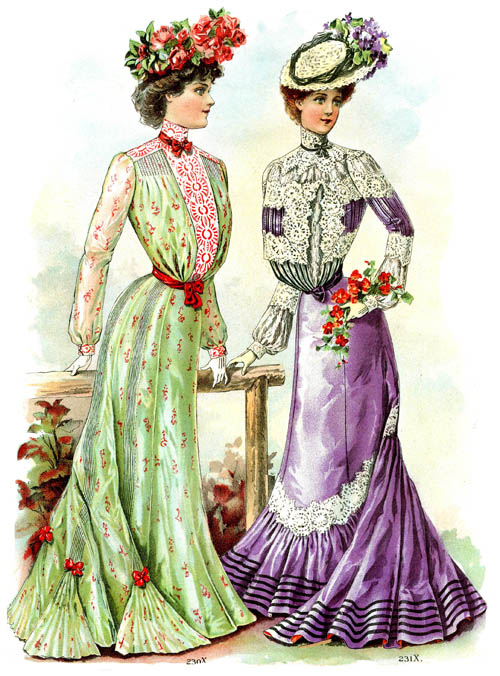
|
For millions of Victorians, Victorian life had nothing to do with servants, etiquette or fashion. For these, the Victorian era was one of abject poverty. The Victorian attitude toward the poor tended to be mixed. On the one hand, more well-to-do Victorians were always encouraged to show charity to the needy. On the other hand, there was the lingering belief that people were poor because of laziness or innate bad character. Was a person a member of the "deserving poor" - poor through circumstances beyond his or her control - or the "undeserving poor", impoverished by bad character and unwise actions? This wasn't simply a matter of hard-heartedness; it was also a question of how to best invest limited resources. But it also led to a great deal of judgmentalism and assumptions - and to "solutions" (such as workhouses and the dreaded treadmill) that we would consider downright abusive today.
|
- Drawn From Life
(Cassell's Family Magazine, 1875)
- A detailed 6-part look at the "down and out" of London.
- The Unemployed
- The Underpaid
- Living on the Edge
- A London Slum
- Vagabonds
- Known to the Police [Juvenile Criminals]
- An Empty House
(Cassell's Family Magazine, 1875)
- A morality tale on the difficult lives of elderly couples hired to occupy and show empty houses to potential renters.
- A Plea for Public Baths
(Cassell's Family Magazine, 1877)
- On the need for public bathing facilities for the poor.
- Metropolitan Sundays: Shoreditch
(Cassell's Family Magazine, 1876)
- A look at "Sunday" on the streets of one of the poorer areas of London.
- An Hour by Seven Dials (Cassell's Family Magazine, 1877)
- A look at a section of London "associated in our minds with all the worst vices of lower London life."
- The Nursing of the London Poor, by Sophia Caulfeild
(Cassell's Family Magazine, 1878)
- A look at the activities of the nursing institutions established specifically to deal with the medical needs of London's poor.
- My District, and How I Visit It by Dora Hope
(Girl's Own Paper, 1881)
- Leaving aside the concept that it is practically a lady's duty to barge into the homes of the poor in order to reform them, this article provides an interesting glimpse of London's poorer inhabitants.
- Some of Our Neighbours/Some of Our Neighbours' Children, by A.R. Buckland
(Cassell's Family Magazine, 1882)
- A look at London's slums and children in poverty.
- Should National Insurance Against Pauperism Be Made Mandatory? (Reader debate)
(Cassell's Family Magazine, 1883)
- The Way Some Folks Live: Lodgers in London's Arches
(Cassell's Family Magazine, 1883)
- Ought the State to Provide Healthy Homes for the Poor? (Reader debate)
(Cassell's Family Magazine, 1884)
- London by Night: Walks in the City of Shadows, by Thomas Archer
(Cassell's Family Magazine, 1885)
- The Dwellings of the London Poor
(Cassell's Family Magazine, 1886)
- An interview with the Rev. S.A. Barnett on the problems of providing housing for the poor.
- Round the Parks, by the Hon. Emily Kinneard
(Girl's Own Paper, 1888)
- A brief article on how the homeless found refuge in the parks of London.
- Christmas Alone: A Phantasy
(Cassell's Family Magazine, 1889)
- Actually a diatribe against the decline of English trade, and its toll upon the poor.
- Workhouse Worries, by Rev. Frederick Hastings (Quiver, 1889)
- What life is like for the elderly living in a British workhouse - the menu includes "a bit" of steamed meat on Tuesdays...
- On Being a "Visiting Lady"
(Girl's Own Paper, 1891)
- More on being a "district visitor."
- Homeless at Night, by Leonard Noble
(English Illustrated Magazine, 1892A)
- According to this author, men who have "come down in the world" through no fault of their own make up a small, but deserving, portion of the ranks of those who have no homes at night in London. Loafers and criminals apparently make up a much larger percentage!
- The "Sorting" of Paupers, by Edith Sellers
(English Illustrated Magazine, 1892A)
- "Our poor-law system recognizes no extenuating circumstances when poverty is the crime; it simply metes out even-handed justice all round." The article contrasts Britain's harsh system (which treats the poor and the criminal alike) with the more progressive treatment and "sorting" of paupers in Austria.
- How Girls Can Help Workhouse Inmates, by B.C. Saward
(Girl's Own Paper, 1895)
- This article is an interesting follow-on to the one above, as the first two parts of the series explain the intricacies of the workhouse administrative system that must be negotiated before ladies can assist inmates in developing skills that can bring them a bit of income. The article also discusses taking workhouse children into one's home.
- The Mother's Prayer, by Emily Macirone
(Girl's Own Paper, 1896)
- A story of a workhouse child.
- Stamping Out the London Slums, by Edward Marshall
(Century Magazine, 1896A)
- A look at London's efforts to eliminate its slums, by the Secretary of the New York Tenement House Commission.
- Some Results of the Higher Education of Women, by Catherine Baldwin
(Century Magazine, 1896B)
- The work of "The Women's University Association for Work in the Poorer Districts of London."
|
Visit Our Victorian Shop
for:
Books
Coloring Books
Beautiful Spiral Journals
Holiday Greeting Cards
|
|


 Discover thousands of Victorian images in our
Discover thousands of Victorian images in our 